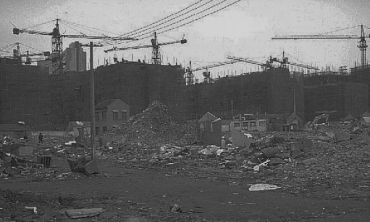So-called “property tycoons” [地王, dì wáng], in public discussion, is a term for units which develop properties by spending big amounts of money to bid for the places they are interested in. Currently, the government [or governments, including local ones] are taking an auctioneering approach to transfer residential areas, and competition leads to astronomical prices, and these prices in consequence add to the housing prices, making them astronomical, too.
This is also because of asymmetries and imbalances between highly monopolist government departments in a oligarchic sellers’ market, and those in need of land. Therefore, concerning the emergence of some property moguls, society frequently worries that prices may reach a new high.
所谓“地王”,是社会舆论对在房地产开发土地招标活动中以硕大的资金数字拍得自己属意地块的中标单位的谐称。目前,政府采用招标拍卖挂牌方式出让住宅用地,往往竞出天价,而这一天价又必然作为成本带进了房价,也把房价推向天价。这也是由于政府部门高度垄断的土地单寡头供应市场与土地需求者的竞争性市场存在着不对称和不平衡所造成。因此,社会对于一些“地王”的产生,往往会产生对于房价又会重回新高的担忧。

On a blank sheet of paper free from any mark, the freshest and most beautiful characters can be written
Baike Baidu defines dìwángs as wealthy people within the social market economy (社会市场经济) who invest in real estate. Although they had no right to own the land, they depend on landuse rights to bid up the prices, to hoard land for speculative purposes, and to exploit construction workers’ labor value.
People’s University of China (or Renmin University of China) economic researchers are predicting that housing prices will drop by almost twenty per cent during the first half of 2011 – a forecast that is rejected by a Guangzhou Daily (广州日报) editorial. Prices may well drop to some extent, it says, but nobody could exactly tell the time when it would happen – the forecast seemed to suggest that it would be in March or April.
The property tycoons are still here, Guangzhou Daily points out, prices of construction material and labor costs have increased, and the October consumer price index rose by 4.4 per cent year on year. The editorial adds that the only reason as to why the forecast warranted attention was the sight of how economic researchers who enjoyed high positions and who lived in ease and comfort (another translation could be “pampered and dignified” – 养尊处优, yǎng zūn chǔ yōu) were spouting serious nonsense (“认真的扯淡”).
____________
Related
Properties: no Reverse Auction Model, October 2, 2010
China jails Tibetan Property Tycoon, The Australian, Aug. 13, 2010
“Perhaps the most Hated Property Magnate”, China Economic Review, May 13, 2010
Olympic Evictions, BBC Blogs, July 19, 2008
[…] temporary, too, just as they are at Argentine Radio and TV, and disputes over journalistic content don’t appear to…